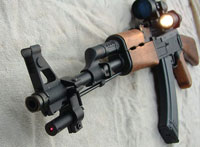US illegally buys 100,000 Russian-made AK-47 to make another bloodbath in Iraq
In a hidden corner of Rome's busy Fiumicino Airport, police dug quietly through a traveller's checked baggage, looking for smuggled drugs. What they found instead was a catalogue of weapons, a clue to something bigger.

Their discovery led anti-Mafia investigators down a monthslong trail of telephone and e-mail intercepts, into the midst of a huge black-market transaction, as Iraqi and Italian partners haggled over shipping more than 100,000 Russian-made automatic weapons into the bloodbath of Iraq.
As the secretive, USD 40 million deal neared completion, Italian authorities moved in, making arrests and breaking it up. But key questions remain unanswered.
For one thing, The Associated Press has learned that Iraqi government officials were involved in the deal, apparently without the knowledge of the US Baghdad command - a departure from the usual pattern of US-overseen arms purchases.
Why these officials resorted to "black" channels and where the weapons were headed is unclear.
The purchase would merely have been the most spectacular example of how Iraq has become a magnet for arms traffickers and a place of vanishing weapons stockpiles and uncontrolled gun markets since the 2003 US invasion and the onset of civil war.
Some guns the US bought for Iraq's police and army are unaccounted for, possibly fallen into the hands of insurgents or sectarian militias. Meanwhile, the planned replacement of the army's AK-47s with US-made M-16s may throw more assault rifles onto the black market, the AP reports.
By December, the Italians had allegedly found a Bulgarian supplier for 50,000 AKM rifles, an improved version of the AK-47 and 50,000 AKMS rifles, the same rifle with folding stock, as well as 5,000 PKM machine guns. Before the weapons were supplied, police made arrests across Italy on February 12, including Mr Bettinotti, Gianluca Squarzolo, 39, the man whose luggage had allegedly yielded the original clue, Ermete Moretti, 55, and Serafino Rossi, 64. Details of the deal were uncovered by Associated Press reporters who saw the emails and court documents.
The Iraqi interior ministry refused to discuss the case publicly but a ministry official, speaking off the record, confirmed that the ministry had sought the weapons. Asked about the irregular channels used, he said the ministry "doesn't ask the supplier how these weapons are obtained".
Why the police in Anbar would need more weapons raises further questions. The Pentagon has issued 169,280 AK-47s, 167,789 pistols and 16,398 machine guns to the 161,000 police throughout Iraq and 28,000 border police.
In a separate development, the costs of the US operation are continuing to soar. The Washington Post reported yesterday that the US military had paid $548m (£274m) to two British security firms to protect the US Army Corps of Engineers, mainly civilians carrying out reconstruction work, more than $200m over the original budget.
The two companies, Aegis Defence Services and Erinys Iraq, signed their contracts in 2004. In July, the security force in Iraq had grown to 2,000 employees, The Guardian reports.
The deal was attributed by the Pentagon to the growth in the insurgency. The Pentagon estimates that there are 20,000 private security contractors in Iraq. Colonel Douglas Gorgoni, senior finance officer for the Corps of Engineers in Iraq, said: "To pay a man or a woman to come over here, put the vest on every day and escort military and civilians around the theatre, knowing that people want to blow them up and kill them, you gotta pay to get that level of dedication."
Source: agencies
Prepared by Alexander Timoshik
Pravda.ru
Subscribe to Pravda.Ru Telegram channel, Facebook, RSS!



